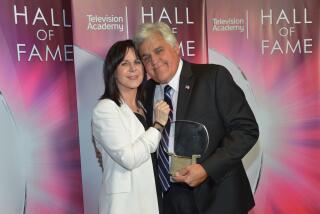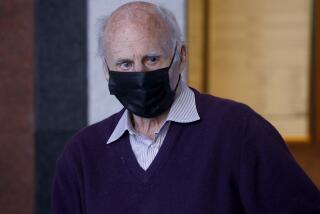Doctor Doubts Mental Ability of Man Who Left Gunderson Money
- Share via
SANTA ANA — A 98-year-old man whose family says was tricked into giving his Orange County attorney a large portion of his estate was probably unaware of many things around him when he signed his will, a geriatrician testified Friday.
Dr. John Boyer, who heads the Center on Aging at the University of Arizona College of Medicine, said he believes Merrill A. Miller had deteriorated greatly both physically and mentally by 1990, when he bequeathed $3.5 million in stock to attorney James D. Gunderson.
“I think there would be little question that (Miller) was demented in the last two years,” Boyer told Superior Court Judge Byron K. McMillan, who is hearing the case without a jury.
Miller’s family has filed a civil suit alleging that Gunderson coerced the $3.5-million bequest from the bedridden Miller, whose estate was worth about $18 million. The terms of the bequest also made the estate liable for an additional $1.7 million in federal inheritance taxes, pushing the total to more than $5 million.
In a will prepared in 1990, Miller, a Leisure World resident who died in February, 1992, bequeathed one-fifth of his holdings in Abbott Laboratories to Gunderson.
Gunderson testified Thursday that Miller willed him the stock because they were close friends. He also said Miller had decided as early as 1984 to name Gunderson as a beneficiary.
Although Gunderson had served as Miller’s attorney for nearly two decades when the will was drawn up, he maintains that he did not prepare Miller’s final will, which bears the signature of Ellsworth DeWeese, Gunderson’s former law partner, as the attorney preparing the will.
But John Westover, the attorney representing Miller’s relatives, said DeWeese was only brought into the picture to hide improper influence that he says Gunderson exerted on the elderly Miller.
A longstanding California Supreme Court ruling says that anything more than a modest bequest to an attorney preparing a will raises questions of impropriety, and the justices ruled that a $20,000 bequest to the attorney in that landmark case was an excessive gift that had to be returned.
Boyer, the geriatrician whose father-in-law was a longtime friend of Miller’s, said Friday that he had never examined Miller for dementia, a disease that undermines many elderly people’s understanding of complex thoughts. He testified that he based his decision that Miller was “not functioning at a level he had performed at previously” on Miller’s medical records and on court depositions taken from Miller’s doctor, live-in nurse and close friends.
Boyer said an action by Miller in 1990 led him to question Miller’s mental capabilities. Boyer said that in late 1989 he sent Miller a letter telling him that Boyer’s mother-in-law had died. The next year, Miller sent his usual Christmas package of dates to Boyer’s mother-in-law, Boyer testified.
Gunderson has been embroiled in controversy since November, 1992, when The Times disclosed that he had inherited or otherwise acquired substantial sums from the estates of several of his clients. After the stories appeared, the State Bar of California announced an investigation into Gunderson’s activities.
He retired in January after State Bar prosecutors said they were ready to file conflict-of-interest charges that could have led to his being disbarred. Gunderson’s lawyers said he surrendered his license because of failing health, not the conflict-of-interest investigation.
More to Read
Sign up for Essential California
The most important California stories and recommendations in your inbox every morning.
You may occasionally receive promotional content from the Los Angeles Times.













